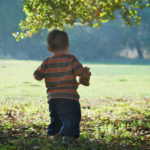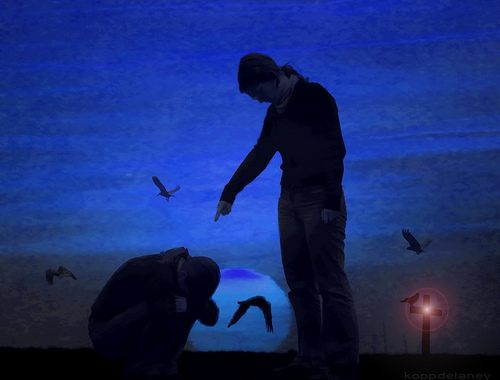We run our website the way we wished the whole internet worked: we provide high quality original content with no ads. We are funded solely by your direct support. Please consider supporting this project.
Becoming Like the Accuser
When the Adam and Eve yielded to Satan and surrendered their God-given authority over the earth and animal kingdom (Gen 3), Satan became “the god of this world” (2 Cor. 4:4), the “ruler of the world” (Jn. 12:32; 14:31) and the “principality and power of the air” (Eph. 2:2) who “has power over the whole world” (1 Jn. 5:19).
Satan is first and foremost a judger. Throughout the Bible we find him bringing judgments against God and humans (The book of Job makes this most clear.) For good reason the Bible labels him “the Accuser” (Rev. 12:10). Not surprisingly, when Adam and Eve opened up their lives to this, they first accepted Satan’s accusation that God is a petty deity who is threatened by their access to the forbidden tree. Once they act on this false picture of God by violating the prohibition, they then judge God to be unmerciful as they hide from him in fear (Gen. 3:8).
When questioned by God, Adam blamed God as well as Eve for his misdeed. “The woman you put here with me – she gave me some fruit from the tree, and I ate it” (Gen. 3:12, emphasis added). Eve in turn also refused to own up to her sin and instead placed all the blame on the serpent (Gen. 3:12).
Though the couple was created to bear God’s image, the Accuser succeeded in getting them to take on something of his image, reflecting his ugly, accusatory character. The couple and all their descendants had become a rebel race of accusers, co-opted into the rebellion of the Powers against the Creator.
Instead of receiving and reflecting God’s life and love toward on another, we now tend to view others through the eyes of our hungry soul and our assumed “knowledge of good and evil.” In our rebellious condition, we tend to “love” those who contribute in some way to our idolatrous sense of fullness of Life—the “good” people—and we tend to despise those we judge to be detracting from our idolatrous sense of fullness of Life—the “bad” people. We judge some as worth loving and others worth hating when we’re under the influence of the Accuser and our stolen “knowledge of good and evil.”
As a result, the human community has become fragmented and filled with violence. The history of humanity has largely been a history of horrific brutality.
Our inability to refrain from violence, despite our remarkable intelligence in some areas and despite our best intentions to avoid it, is arguably the single greatest sign of our subjection to the one whom Jesus says “was a murderer from the beginning” (Jn. 8:44). When people are subjected to the Accuser and filled with judgments, violence is never far away.
The biblical record bears witness to our violent tendencies as a race of accusers. No sooner had the first couple been expelled from the Garden than their first child murdered their second, judging that Abel was in competition with him for God’s approval (Gen 4). As violence always does, this first act of violence set off a chain reaction of violence, to the point that Lamech, a descendent of Cain, boasted that his thirst for vengeance was ten times great than what God had threatened (vs. 24)!
Violence under the reign of the Accuser continued to escalate to the point that, within a couple millennia the world had become so “full of violence” the Lord had to stoop still further and start the whole creation project over again by sending a flood (Gen 6). Had he not done this, all indications are that God’s plan for the human race would have been hopelessly derailed. It was God’s only hope of rescuing the human race from irreversible destruction.
Yet, as drastic as it was, this measure did not put an end to the reign of the destructive Powers. Nor did it reform our fallen accusatory nature. Consequently, sin and violence began to encroach back into the world soon after the flood. Indeed, the rest of the biblical narrative and the whole of human history is one, long, tragic testimony to the truth that, so long as we’re separated from God, we can’t help but separate ourselves from one another. Until we are free from our bondage to the Accuser, we simply can’t stop accusing, which invariably results in some people judging that their enemies don’t deserve to live.
Category: General
Tags: Judgment, Tree of the Knowledge of Good and Evil, Violence
Topics: Following Jesus
Related Reading

Dear Greg: My Spouse Thinks Spanking is Okay and I Do Not (podcast)
Greg offers thoughts on how spanking plants a seed of redemptive violence and offers ideas for resolving differences of opinion between spouses. Episode 507 http://traffic.libsyn.com/askgregboyd/Episode_0507.mp3

Why do some of Jesus’ parables depict God in violent ways?
Greg deals with the question of what it means that some of Jesus’ parables seem to depict God in violent terms. In addition to getting an answer to this question you’ll be treated to a window into Greg’s graceful way of moving through the world. Really classy. Enjoy!

The Phinehas vs. Jesus Conundrum
I’ll be frank. This is not a blog that will be easy for some people to read. But it’s a blog I believe every follower of Jesus should read – even if you have to force yourself to press on. It’s about something we all wish was not true. It’s about the way the Bible…

What Went Wrong in the Garden of Eden?
When Adam and Eve ate from the tree, they imposed their will into the center of Paradise, and this was the act that destroyed Paradise. They invaded the proper domain of God. Instead of recognizing that they were supposed to derive life from the center, they placed themselves in the center. They tried to become…

Dancing with the Triune God
What does it mean to live in the presence of God now? How do we do this? What does it mean to be in the presence of God for eternity? In this video produced by The Work of the People, Greg Boyd shares what it means to for us to be in God’s presence and allow…

Sermon: The Judgment Boomerang
The wrath of God is a misunderstood topic. In this sermon, Greg shows how sin has natural consequences that boomerang back to us. While God’s wrath has serious consequences for us, we need to understand how God uses his wrath. In the clip, Greg talks about the mistaken picture of God that allows for the…

